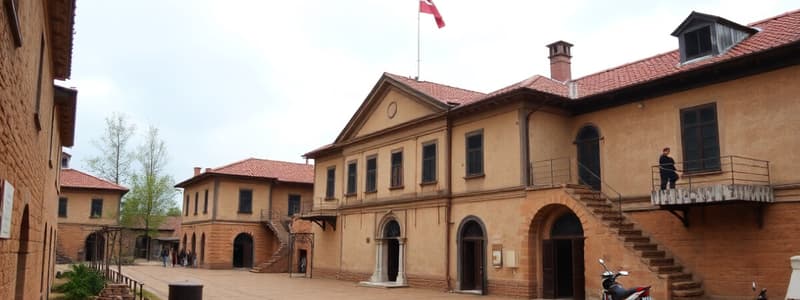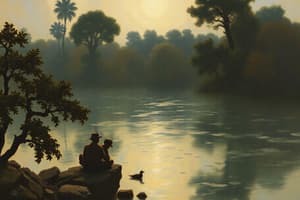Podcast
Questions and Answers
What are the two main categories of archaeological records?
What are the two main categories of archaeological records?
- Documents and oral accounts
- Fossils and artifacts (correct)
- Fossils and manuscripts
- Maps and photographs
Which of the following is a published material considered a primary source?
Which of the following is a published material considered a primary source?
- Diary
- Manuscript
- Travelogue (correct)
- Memoir
What do paintings and artworks primarily represent in historical studies?
What do paintings and artworks primarily represent in historical studies?
- Contextual interpretation of periods (correct)
- Factual evidence of events
- Political ideologies
- Scientific discoveries
What describes the function of maps in historical studies?
What describes the function of maps in historical studies?
Which of the following best describes the Manunggul Jar?
Which of the following best describes the Manunggul Jar?
What period do the Asian tradeware ceramics at the site date to?
What period do the Asian tradeware ceramics at the site date to?
Which artifact is considered the oldest human fossil remains found in the Philippines?
Which artifact is considered the oldest human fossil remains found in the Philippines?
What does external criticism primarily assess?
What does external criticism primarily assess?
What is one test of authenticity mentioned?
What is one test of authenticity mentioned?
Which primary source category includes items such as sketches and cartoons?
Which primary source category includes items such as sketches and cartoons?
What type of historical source would a diary be classified as?
What type of historical source would a diary be classified as?
Which aspect is primarily evaluated in internal criticism?
Which aspect is primarily evaluated in internal criticism?
What indicates a possibility of fabrication in a document during external criticism?
What indicates a possibility of fabrication in a document during external criticism?
Which test assesses the reliability of an author?
Which test assesses the reliability of an author?
What is one indicator of an author's willingness to tell the truth?
What is one indicator of an author's willingness to tell the truth?
Which of the following best describes corroboration in historical analysis?
Which of the following best describes corroboration in historical analysis?
What is the definition of history as described in the content?
What is the definition of history as described in the content?
Which of the following is NOT classified as a type of primary source?
Which of the following is NOT classified as a type of primary source?
What distinguishes secondary sources from primary sources?
What distinguishes secondary sources from primary sources?
Which example is given as a primary source related to the Tejeros Convention?
Which example is given as a primary source related to the Tejeros Convention?
What type of historical source is a legal document classified as?
What type of historical source is a legal document classified as?
Which of the following is a characteristic of primary sources?
Which of the following is a characteristic of primary sources?
What does historiography refer to?
What does historiography refer to?
Which of these is an example of a secondary source?
Which of these is an example of a secondary source?
What is a primary source in historical research?
What is a primary source in historical research?
Which of the following defines historiography?
Which of the following defines historiography?
Who pioneered nationalist historiography in the Philippines after World War II?
Who pioneered nationalist historiography in the Philippines after World War II?
What is meant by 'history from below' according to Reynaldo Ileto?
What is meant by 'history from below' according to Reynaldo Ileto?
Which characteristic is NOT typically associated with contemporary Philippine historiography?
Which characteristic is NOT typically associated with contemporary Philippine historiography?
What did the Americans’ portrayal of their lifestyles during colonial times contrast with?
What did the Americans’ portrayal of their lifestyles during colonial times contrast with?
In historiography, what does 'external criticism' analyze?
In historiography, what does 'external criticism' analyze?
What does the term 'colonial historiography' often highlight?
What does the term 'colonial historiography' often highlight?
What are primary sources typically used for in research?
What are primary sources typically used for in research?
Why are most history textbooks categorized as secondary sources?
Why are most history textbooks categorized as secondary sources?
What is a common disadvantage of accessing online primary sources?
What is a common disadvantage of accessing online primary sources?
What is an advantage of using primary sources for historical research?
What is an advantage of using primary sources for historical research?
What challenge arises from writing about a nation's history?
What challenge arises from writing about a nation's history?
In presenting the symbols of the Philippine flag, what should the research team focus on?
In presenting the symbols of the Philippine flag, what should the research team focus on?
What is a key aspect of conducting interviews for historical research?
What is a key aspect of conducting interviews for historical research?
Which document types are important for constructing a personal historical narrative?
Which document types are important for constructing a personal historical narrative?
Flashcards are hidden until you start studying
Study Notes
Meaning of History
- The study of past events presented in chronological order and with explanation.
- A narrative with a purpose.
- A story with meaning.
- Individuals who write about history are called Historians
- The practice of historical writing is called Historiography
Sources of History
- Classified into two categories: Primary and Secondary Sources.
- Primary sources are testimony of an eyewitness, either participants or witnesses, produced by a contemporary of the event it narrates.
- Primary Sources include: Eyewitness accounts, diaries, letters, legal documents, official documents (government or private), photographs.
- Secondary sources interpret and analyze primary sources.
- Secondary sources are one or more steps removed from the event.
- Examples of Secondary Sources: History textbooks, printed materials (serials, periodicals which interpret previous research).
General kinds of Historical Sources
- Documents (published and unpublished, including books, magazines, journals, travelogues, transcriptions of speeches, manuscripts, archival materials, memoirs, diaries).
- Archaeological Records (fossils, artifacts).
- Oral and Video Accounts.
Visual Sources
- Maps indicate locations, topography, trade routes, travel routes, structural build-up.
- Photographs reflect social conditions of historical realities and everyday life, give us visual ideas of places, historical events, and people.
- Sketches, drawings, paintings are visual representations based on the artist’s expression or interpretation of events and ideas, which become useful historical sources when we want to know or understand the context of the period in which they are made.
- Cartoons for political expression or propaganda indicate the temper of the times.
Object and Artifacts
- The Manunggul Jar is an elaborately designed burial jar with anthropomorphic figures on top of the cover that represent souls sailing to the afterworld in a death boat.
- The Manunggul jar was declared a National Cultural Treasure.
- The Callao Man (67,000 years old) is the oldest human fossil remains found in the Philippines. It was discovered in 2007 at the Callao Caves in Penablanca, Cagayan Valley.
- The Calatagan, Batangas burial site yielded 505 burials and 521 associated ceramics, porcelains, and stoneware jars from China, Thailand, and Vietnam, as well as hundreds of local earthenware and iron tools.
- The Asian tradeware ceramics of the site date to the early to mid-Ming Dynasty (14th-15th centuries AD).
Historical Criticism
- To be used as evidence in history, a source must be evaluated for authenticity and credibility.
- External Criticism focuses on the problem of authenticity.
- Internal Criticism focuses on the problem of credibility.
External Criticism
- The problem of authenticity: To spot fabricated, forged, faked documents, distinguish a hoax or misrepresentation.
- Tests of Authenticity:
- Determine the date of the document to see whether they are anachronistic (pencils did not exist before the 16th century).
- Determine the author (handwriting, signature, seal).
- Anachronistic style (idiom, ortography, punctuation).
- Anachronistic reference to events (too early, too late, too remote).
- Provenance or custody (determines its genuineness).
- Semantics (determining the meaning of a text or word).
- Hermeneutics (determining ambiguities).
Internal Criticism
- The problem of credibility: To determine if the relevant particulars in the document are credible.
- Verisimilar – as close as what really happened from a critical examination of best available sources.
- Tests of Credibility:
- Identification of the author (to determine his reliability; mental processes, personal attitudes).
- Determination of the approximate date (handwriting, signature, seal).
- Ability to tell the truth (nearness to the event, competence of witness, degree of attention).
- Willingness to tell the truth (to determine if the author consciously or unconsciously tells falsehoods).
- Corroboration (historical facts – particulars which rest upon the independent testimony of two or more reliable witnesses).
Colonial Historiography
- Period viewed as either darkness or backwardness (Spaniards), or advancement or enlightenment (Americans).
- Filipinos were perceived as “barbaric” under Spain and “civilized” under America.
- Jose Rizal annotated Antonio de Morga’s Sucesos de las Islas Filipinas.
- Filipinos perceived their colonial past as being maltreated by “wicked Spain” and rescued by “benevolent America”.
Philippine Historiography After World War II
- Teodoro Agoncillo pioneered nationalist historiography by highlighting the role of the Filipino reformists and revolutionaries from 1872.
- “Lost history” refers to the history of Filipino resistance against Spanish rule that Agoncillo uncovered.
- Renato Constantino wrote “people's history".
- Zeus Salazar developed the "Pantayong Pananaw" (from-our-point-of-view perspective).
- Reynaldo Ileto wrote "history from below".
- Samuel Tan mainstreamed the role and relevance of Filipino Muslims in the country’s national history.
Characteristics of Contemporary Philippine Historiography
- Colonial Histories
- Emphasis on Lowland Christianized Filipinos.
- Political Narratives.
- Patriarchal Orientation.
- Elite-centric Perspectives.
Studying That Suits You
Use AI to generate personalized quizzes and flashcards to suit your learning preferences.




